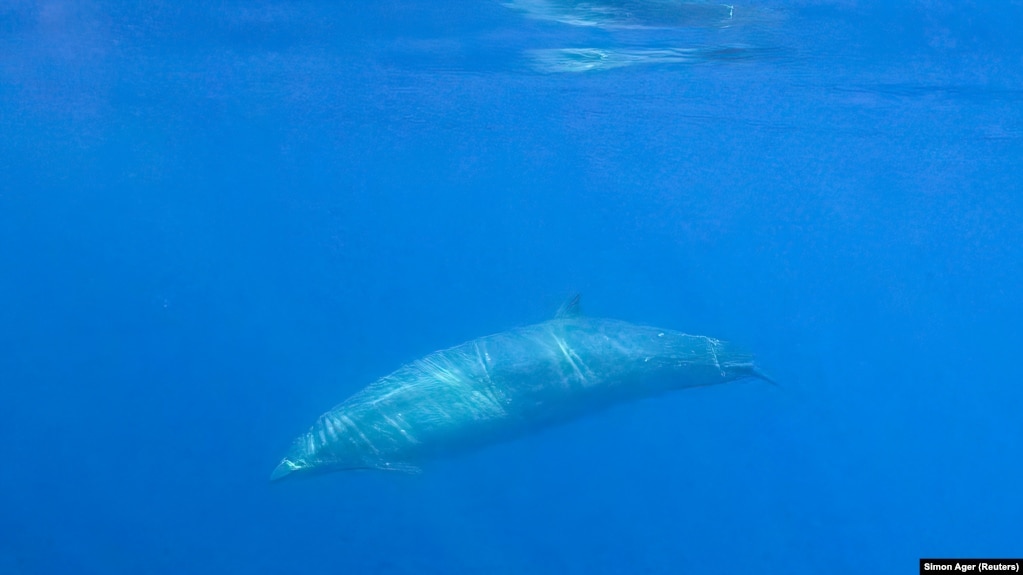
A possibly new kind of beaked whales swims underwater in this undated photo provided by the Sea Shepherd Conservation Society. (Simon Ager/Sea Shepherd/CONANP/Handout via REUTERS)
Researchers believe they have found a previously unknown kind of whale in waters off Mexico's western coast. If others confirm the finding, the new whale would be an important discovery among giant animals.
The team of researchers came upon three unusual whales while following a rare group of beaked whales on Nov. 17. The whales were near Mexico's distant San Benito Islands, about 500 km south of the U.S. border. Beaked whales usually avoid contact with humans.
Jay Barlow studies sea animals at the Scripps Institution of Oceanography in San Diego. He said, "These animals popped to the surface right next to the boat."
He noted that it was a very unusual meeting. "It's very rare to even see a beaked whale, and to find a friendly group of beaked whales, it's even rarer," he said.
Barlow said he and other researchers did not realize they were seeing a possible new kind of whale until later. The group, led by the non-profit Sea Shepherd Conservation Society, saw something different about the whales' teeth when they studied photos they took of the animals. The underwater recordings of the whales' calls also suggested they were different from all others.
The researchers are now waiting for test results on water they collected near the whales. There could be skin cells in the water from the whales. If so, they will examine the DNA to confirm whether the whales are a new species.

The RV Martin Sheen scans for a possibly new species of beaked whales in this undated photo provided by the Sea Shepherd. (Simon Ager/Sea Shepherd/CONANP)
'Mysteries in the sea'
Beaked whales get that name because of their pointy noses. They live mostly in waters far away from the mainland, such as off the San Benito Islands.
Though up to 5 meters long, they can be hard for scientists to see. That is because they usually swim and eat at depths of around 914 meters. They only come up at times for air. In the deep water, the animals can stay away from their main enemy, killer whales.
Andrew Read is a marine biologist at Duke University. He said, "The fact that they were looking for a very rare whale, and that they happen to find something completely different, is remarkable and wonderful, and just the joy of doing science. That's what we all live for."
Read said that finding a new species is a rare event. Barlow's team has evidence about the whales that looks like a new discovery. Read said the DNA testing would help confirm it.
Barlow was hopeful about the chance of confirming the beaked whales as a new species. That would bring the number of known beaked whale species to 24.
Barlow said the whales are as big as a horse. He noted that it is hard to imagine people not seeing something that big on land, "But there's a lot of mysteries in the sea."
I’m Jill Robbins.
Cassandra Garrison reported on this story for Reuters. Jill Robbins adapted it for Learning English. Hai Do was the editor.
_________________________________________________________________
Words in This Story
previously – adv. happening before the present time
species – n. biology : a group of animals or plants that are similar and can produce young animals or plants
beaked – adj. (of an animal) having a hard usually pointed part covering the mouth
pop – v. to come from, into, or out of a place suddenly or briefly
marine – adj. of or relating to the sea or the plants and animals that live in the sea
Comprehension Quiz
What do beaked whales usually avoid?